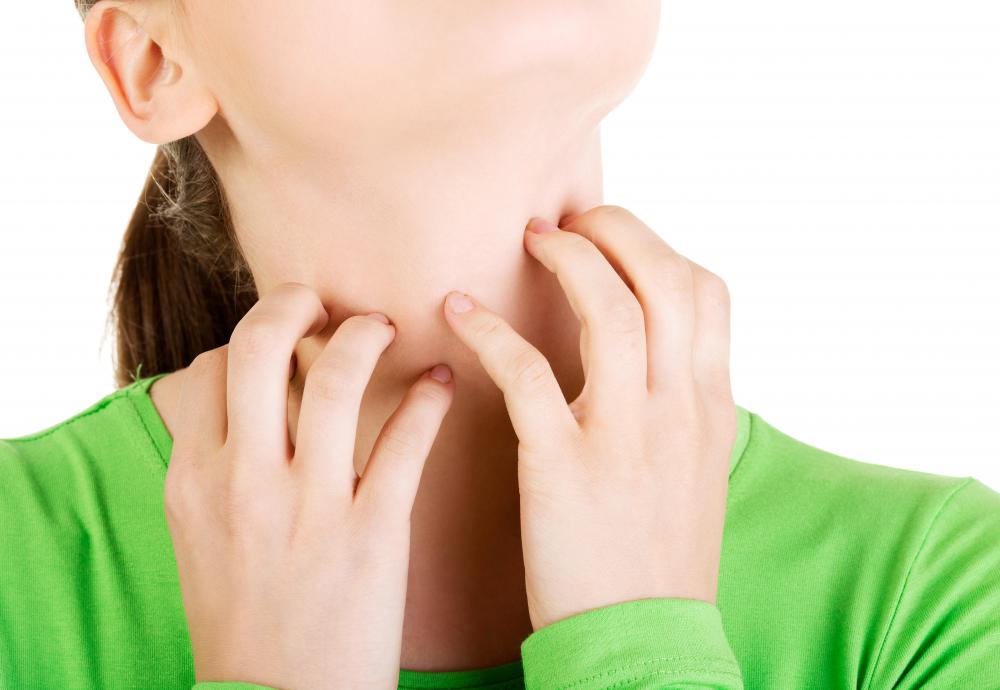At TheHealthBoard, we're committed to delivering accurate, trustworthy information. Our expert-authored content is rigorously fact-checked and sourced from credible authorities. Discover how we uphold the highest standards in providing you with reliable knowledge.
What are the Most Common Causes of Hives on the Neck?
Hives on the neck are commonly caused by allergies, stressful situations, or certain medicines. People also occasionally develop them when they sweat profusely or get sick with a virus or other type of infection. Hives can be caused by almost anything, but allergies are usually to blame. They normally go away within a few hours, but in some cases they persist for as long as an entire day. Some people also have chronic problems with hives that keep recurring after disappearing.
There are many different allergies that people can have that might cause them to break out in hives on the neck. Bee sting allergies, reactions to various bath or cleaning products, and even food allergies can cause them to develop. Most of the time, the hives cease to be a problem as soon as whatever is causing the reaction is removed from the immediate surroundings of the person experiencing them. Sometimes it's hard to be certain that the hives were caused by allergies, and people often have to go through a trial and error process to find out exactly what they might be allergic to.

When hives on the neck develop along with other problems such as facial swelling, throat swelling, and unusual blistering or itching, medical attention should be received right away. If hives occur along with these other serious symptoms, they are most likely the result of a potentially serious allergic reaction. Some people have allergies to things like bees, peanuts, and various types of fish that are serious enough to be considered life threatening, and getting medical attention as soon as possible could prevent tragic consequences.

Stressful situations and nervousness might also cause hives on many places, including the neck. Many people develop neck hives after unpleasant confrontations with other people or just before an important event is about to occur in their lives. It is also not uncommon for hives to develop when a person is feeling scared. Anything in life that can entice nervousness and tension could result in this reaction. When they develop because of a stressful experience, they usually go away as soon calm feelings return.

Neck hives might also develop when people become sick from either some type of disease or an infection. There are also various medicines with side effects that may cause neck hives. Regardless of the cause, hives are almost always temporary. Taking showers in cold water, using oral antihistamines, and avoiding things that trigger neck hives are things medical professionals often recommend for dealing with hives. It is usually not possible to force them to go away, but they almost always do within a short period of time with or without treatment.
AS FEATURED ON:
AS FEATURED ON:


















Discussion Comments
This is kind of embarrassing but I want to share how I got a neck rash last year so that other people don't make the same mistake. I was at the mall looking at perfume testers. I usually spray the perfumes on those tester sticks or on my wrist to check the scent. For some reason, I sprayed one of the perfumes directly on my neck. It smelled good!
I walked out of there and went into another store. My neck suddenly started to itch very bad. I rushed to the bathroom and was shocked to see my neck red and covered in hives. I had an allergic reaction to the perfume! I washed my neck with soap and water right there and headed back home. My neck was still itchy so I took a shower to make sure the perfume was gone. It took several hours, but the hives eventually disappeared.
Ever since this incident, I never test perfumes on my skin.
@turkay1-- Some viral infections can cause hives (urticaria). But if the rash is only in the neck area, then it's probably just an allergic reaction. If it was caused by an infection, the rash would have affected other parts of her body.
Many people have allergies to laundry detergents, soaps and body washes. Your instructor probably had contact with something she's allergic too. Food allergies can cause localized hives too. My cousin is allergic to strawberries and she gets hives on her face and neck.
I had class today and when I got there, I saw that my instructor's neck was covered in hives! No one asked her what happened, but it was quite bad. What might be the cause? It can't be anything infectious right?
Post your comments